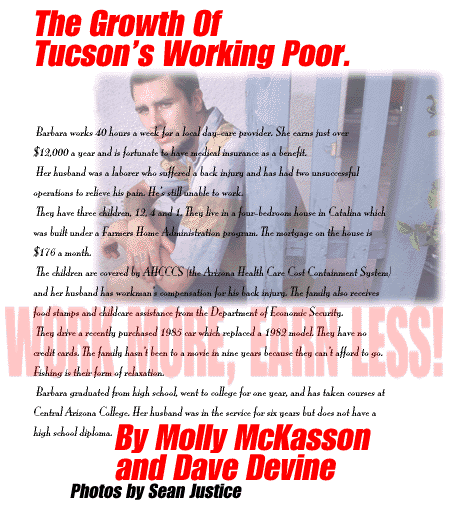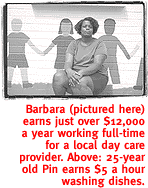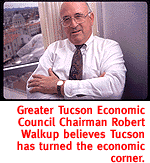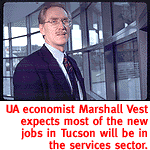
THE 1960S, WHEN many of the Baby Boomers graduated from
high school, were a golden age for working families in Tucson.
As the graduates headed off to college or a career, they were
recipients of a great optimism: Work hard and The Dream will be
yours.
Their parents sacrificed for them, and their local leaders nurtured
a Big Plan to secure their community's future: Keep building new
homes...Keep selling things to new arrivals...Keep Davis-Monthan
Air Force Base open...Keep winter tourists coming from the Midwest
so they'll eventually pack up and move here...Keep your fingers
crossed.
In those days Tucson had a solid middle class. Home ownership
was the norm if Dad had a steady job. Rich and poor alike were
given tremendous attention at Tucson high schools. The Cold War
was very good to families with members working at Hughes. Many
graduates took over family businesses. Almost all of them did
better than their parents.
But something went wrong. As the figures show, starting in the
early 1970s, incomes in Tucson started to drop (See box).
They kept dropping through good times and bad, until they reached
a point a few years ago where tens of thousands of hard-working
households in Tucson simply couldn't make ends meet.
Between 1980 and 1990, the fall in wage rates was dramatic. Many
neighborhoods in the city were destabilized by the huge drop in
owner-occupied homes. The center of town changed as poverty spread
north and east. The social problems in these neighborhoods increased
as the income levels fell.
THIS YEAR'S LOCAL high school graduating classes face a different
world. There's no economic security for hard-working kids. Life
in this community looks pretty bleak for at least half of them,
and that's not even counting the one-third who dropped out of
school.
The decreasing wages and growing poverty, coupled with Pima County's
dramatic increase in child abuse, Domestic Violence, teen pregnancy
and youth violence, confirm beyond a doubt what many have long
feared: The Big Plan has failed.
It has failed to create sustainable economic opportunity or preserve
our quality of life. Looking back, it appears to have been less
a grand design for building a healthy community and more a scheme
for a privileged few to make quick money while land prices were
down.
So now what do we do? Today's high school students shrug their
shoulders and blame bickering politicians and greedy developers.
 Challenge them to do better than that; they tell you how many
of their friends carry guns for protection. Argue they must keep
their hopes up, get more education and avoid cynicism; they tell
you about working-poor parents who pay a third or more of their
minimum-wage earnings for rent, who don't qualify for health care,
who drink or use drugs in ever-increasing numbers.
Challenge them to do better than that; they tell you how many
of their friends carry guns for protection. Argue they must keep
their hopes up, get more education and avoid cynicism; they tell
you about working-poor parents who pay a third or more of their
minimum-wage earnings for rent, who don't qualify for health care,
who drink or use drugs in ever-increasing numbers.
Of course, no one expects teenagers to turn this ship around,
or keep it from sinking. We do expect our local leadership to
be hard at the job. Unfortunately, up until recently, most of
those folks had done little to create an economy that's strong
on family and household income.
In the face of increasing hardship, some local leaders have become
constant advocates for more social services. Others have supported
enterprise zones and better training programs. But if our economic
development efforts continue to create minimum-wage jobs, we're
just spitting in the ocean.
Part of the reason for the inaction is that it's damn hard to
change business as usual. The other part, for some, is that initially
the increase in poverty and working poor families was confined
to the traditionally low-income areas of town. But all of that
changed several years ago.
Working poor households within the city limits became a painfully
visible part of our community in the 1980s. About the same time,
there was a quantum leap in the rate of murder and violence among
Tucson's teens.
That's when the light went on for some local leaders. They didn't
need U.S. Census Bureau maps to locate poverty and working-poor
families, they just had to follow the graffiti all over town.
It didn't take a genius to notice poverty was working its way
north and east.
Pin has worked for 18 months as a dishwasher at a downtown
restaurant. He earns $5 an hour for his full-time job, which includes
medical insurance benefits.
He lives less than a mile from where he works, so Pin walks
or skateboards to his job. He shares an apartment with his brother,
and they pay $475 a month, plus utilities, in rent.
At 25, Pin has ambitions to learn how to fix the machinery
he works with instead of washing dishes with it. He graduated
from high school and attended Pima Community College for one year
and has hopes of returning.
Pin has lived in Tucson since 1980. The word "Poverty"
is tattooed on his neck, indicating his membership in the "Poverty
Posse" at Sabino High School, the group that didn't drive
new cars to school.
In his spare time, he likes to drink cheap beer and play in
a band. If he could, he says, he'd drink Bass, but he can't afford
it.
He has no savings, no credit cards and pays bills in cash.
He believes he could probably eat better if he quit his job and
applied for food stamps, but he doesn't want to do that.
POVERTY AMONG THE working class continues to gnaw away at our
community. But at least now people are talking about addressing
the problem. Plus, temporarily, wages have gone up and may continue
to do so. However, the rate of that growth, if it is to occur,
will depend upon a number of factors. Some are beyond our control.
Others depend on the major players who influence economic development
in Tucson.
The Greater Tucson Economic Council (GTEC) recently released
its long awaited "Greater Tucson Strategic Economic Plan."
It outlines what the organization sees as the basic needs to improve
the economic standards of the community. The issue of low wages
played an important role in the document.
While admitting the local economy creates service sector and
other low-paying jobs much faster than others, the plan stresses
the need to continue past programs and policies. Through its use
of attracting specific "clusters" of employers to town,
GTEC hopes to offset the customary high rate of job creation in
low-paying sectors of Tucson's economy.
 Robert Walkup, GTEC chairman, believes the economic corner has
already been turned. He said a broad change occurred in the local
economy in the last few years, thanks in part to the relocation
of Hughes employees. He added the increased competition among
teleservice companies to keep their trained employees has driven
up wages in that sector.
Robert Walkup, GTEC chairman, believes the economic corner has
already been turned. He said a broad change occurred in the local
economy in the last few years, thanks in part to the relocation
of Hughes employees. He added the increased competition among
teleservice companies to keep their trained employees has driven
up wages in that sector.
Within the next four years, Walkup predicts, real wages in Tucson
should be higher than they were in 1990.
Marshall Vest, director of the University of Arizona's Forecasting
Project in the College of Business and Public Administration,
agrees that local wage rates should continue to climb through
the end of the century. This may occur at about the rate of inflation,
or even higher, resulting in no real gain for workers, he said.
Vest attributes this rise mostly to a change in demographics.
Fewer people are entering the labor force and, therefore, competition
for employees will force wages up.
In his "Economic Outlook" for 1996/'97, Vest predicted
about 8,200 jobs will be created in the Tucson metropolitan area
during the year. Of these, he writes, "Most of the new jobs
will be in the services sector (which will expand by nearly 5,000).
Trade (2,000 jobs) and government (1,000) will account for most
of the remaining new jobs. All other sectors will grow very little,
if at all."
Ben Buehler-Garcia, senior vice-president of Tucson's Metropolitan
Chamber of Commerce, believes cooperation among economic development
groups is essential to achieve increasing wage rates. Although
the Chamber aggressively opposed the local and statewide initiatives
that would have increased the minimum wage, he thinks the goal
of increasing average salaries is vital and that the Tucson business
community understands its importance. He also stresses the importance
of teamwork, noting "finger pointing won't lead to solutions."
Jaime Gibbons, president of the Hispanic Chamber of Commerce,
agrees. He also believes it's the responsibility of employers--and
not elected officials--to achieve the goal of higher wages. The
government, he said, should provide a level playing field and
then let the private sector address the problem.
These calls for teamwork and togetherness, however, overlook
the depressing reality of the past 25 years. Cooperation is a
laudable goal, but probably the only way to return to the wage
levels Tucson enjoyed in the 1960s is through a radical shift
in our economic development goals.
To do that would require trying to slow down the growth of service
sector jobs, a strategy not even mentioned in the GTEC document.
At the same time, more emphasis would need to be placed on increasing
the number of higher-paying jobs. This change would require a
reallocation of financial resources away from present government
subsidies for the housing and tourism industries--a sensitive
subject rarely discussed by most local politicians.
For more than a decade, city leaders have placed more emphasis
on tourism and service sector employment than they have on creating
higher-paying jobs (See box). And, unfortunately, Tucson
has gotten just what it paid for.
This trend shows no signs of ending, which means most new jobs
created in Tucson's economy will be in the low-paying sectors.
So much for the optimism that local wages will increase much above
the rate of inflation.
 After serving in the military for 20 years, Dale moved to
Tucson six years ago because he has relatives here. He searched
almost two years for a job his technical training in the service
had qualified him for, until he finally found his current ad-services
specialist position.
After serving in the military for 20 years, Dale moved to
Tucson six years ago because he has relatives here. He searched
almost two years for a job his technical training in the service
had qualified him for, until he finally found his current ad-services
specialist position.
At 47, he drives a 20-year-old car and lives in a rented mobile
home, for which he pays $275 a month. In his spare time, he reads,
watches videos, and cruises the Internet.
Dale's take-home income is $13,000 a year. He also receives
$300 a month in tax-free disability pay from the military. He
has limited savings--so little, he says, that if he lost his job
he would probably become homeless.
His medical insurance is provided through the Veterans Administration.
He still has two credit cards from when he was earning almost
twice as much in the military, but other companies have turned
him down since he left the service.
He's able to take a trip to see relatives in Florida every
couple of years, and he's satisfied with his job because it provides
him with enough income to pay his bills and to buy a few "toys,"
like his computer. But, he added, he was willing to give up some
of the things others want in order to do that. He tries to give
money to charity, even if only small amounts.
THE IMPORTANCE OF the wage-rate problem has at least become apparent
to some local elected officials. In February the Tucson City Council
decided to hold a series of study sessions on the issue of reducing
poverty in Tucson. So far however, these meetings have not even
been scheduled.
In the coming months one would hope more and more discussions
will take place about how to increase wage rates significantly
while reducing poverty in Tucson. Perhaps some of the ideas listed
here might find their way into the discussion.
Feel free to add your own ideas. Send them to the Tucson Weekly,
P.O. Box 2429, Tucson AZ 85702.
Anonymous works 30 hours a week for a major employer in town.
She asked that her name not be used for this article.
She was a single mother supporting several children until
they left home a few years ago. She worked a full-time job during
the week and two part-time jobs on the weekend to do that. She
did it for three years after moving to Tucson in 1988.
Now 52, she has a bachelor's degree and takes home $650 a
month from her job. She drives a 1985 model car, has one credit
card, and tries to visit her family in Florida once a year. She
takes the train to save on expenses.
She rents a house near her job and splits the $700 a month
cost with a roommate. She does this in part because it enables
her to walk to work most of the time. She also pays one-half of
the utility bills for the home.
Her job provides her with health insurance and a mandatory
retirement program. But other than that she has no savings. For
entertainment she attends free concerts or visits with friends.
She's paying off a student loan for herself and trying to
help her children with their educational expenses.
Anonymous is taking graduate courses and hopes to finish in
December. When she does, she plans to look for a job in her field.

